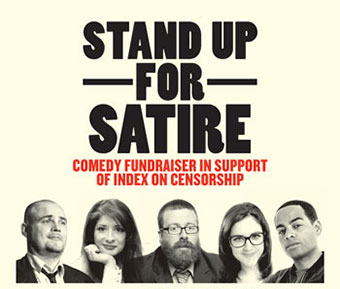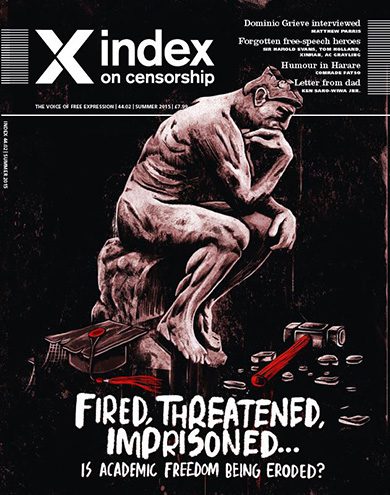14 Jul 2015 | Magazine, mobile, Volume 44.02 Summer 2015, Zimbabwe

Zambezi News cast, pictured left to right – Michael Kudakwashe, Samm Farai Monro, Chipo Chikara and Tongai Makawa
The Zimbabwean Minister of Impending Projects proudly stands in front of a mine that he has christened Mine Mine. “Because,” he says, “it’s mine. And because a diamond mine is a minister’s best friend.” This corrupt politician who has never completed a single programme in his department, is a fictional character on Zambezi News, a satirical show I helped create, with fellow activist Outspoken.
Zambezi News has become Zimbabwe’s leading satirical programme, reaching millions of viewers across the country and the whole continent. The show is a parody of the state-controlled propaganda machine, the Zimbabwe Broadcasting Corporation, and mimics the station’s sycophancy to the ruling party, the Zimbabwe African National Union Patriotic Front (Zanu PF). Quite frankly, our show started off by fluke. Outspoken and I have a background as spoken word and hip-hop artists and were approached by a friend involved in a local film festival to do a live news skit. When it aired at the festival and was really well received, we knew we were on to something.
We shot the first season in 2011 as a faux news show with three comic newscasters. The show cut between the newsroom and satirical reports from the field and featured a string of outrageous characters. We even did a special episode for the 2013 elections where our newscaster, Mandape Mandape, showed how easy it is to vote – unless you are young, urban and likely to vote for the opposition. We publicised the show around the country using partners ranging from community radio stations to activist groups. We also pushed it heavily on social media and shared the videos on YouTube. Interest was so great we then produced 10,000 DVDs, which were requested in more than 100 different towns and villages in Zimbabwe. Since then we have shot two more seasons. The show has been viewed by six million Zimbabweans, and we have been invited to do live shows in Sweden, South Africa, Swaziland and the USA.
The fact that there is thriving satire in Zimbabwe and that we, as the cheeky cast of Zambezi News, are still alive confuses a lot of people. Most TV and radio in Zimbabwe is controlled by the state or cronies of the ruling party, so the public has a growing appetite for comedy and satire that present an alternative voice. People like to laugh and think about our crazy situation at the same time.
“Political satire has provided comic relief to many Zimbabweans, but, above all, it has been an innovative way of speaking truth to power,” said political commentator Takura Zhangazha. “Zambezi News is key in carrying on this tradition especially across various media spectrums and between generations.” The fact that we’re still alive? Well, I guess that’s down to luck and the fact that we hide in plain sight.
 Index on Censorship has been publishing articles on satire by writers across the globe throughout its 43-year history. Ahead of our event, Stand Up for Satire, we published a series of archival posts from the magazine on satire and its connection with freedom of expression.
Index on Censorship has been publishing articles on satire by writers across the globe throughout its 43-year history. Ahead of our event, Stand Up for Satire, we published a series of archival posts from the magazine on satire and its connection with freedom of expression.
14 July: The power of satirical comedy in Zimbabwe by Samm Farai Monro | 17 July: How to Win Friends and Influence an Election by Rowan Atkinson | 21 July: Comfort Zones by Scott Capurro | 24 July: They shoot comedians by Jamie Garzon | 28 July: Comedy is everywhere by Milan Kundera | Student reading lists: Comedy and censorship

However, being a leading satire show and poking fun at the powerful, comes with risks: one of our main actors in Zambezi News has been threatened by people we suspect are state security agents. The actor was approached after we launched our first season in 2012. He was threatened for working on an “anti-government, regime-change agenda” and told that he would be “dealt with”. Our content is blacklisted on state-controlled radio and TV, while we often get attacked by Zanu PF-aligned bloggers who write that we produce “anti-government propaganda”. Earlier this year, as we prepared to launch our third season, the police called up to ask if we had “police clearance” to do so. We also get harassed by the officials from the censorship board and the Central Intelligence Organisation who ask us: “Do you have accreditation and clearance to do this?” I guess this means that they are watching our show, so half our job is done.
We are not alone. Other online satirical shows are emerging, including PO Box, The Comic King Show and LYLO, to name but a few. PO Box has been a viral success in Zimbabwe with its weekly five-minute skits posted on Facebook with the skits getting 20,000 views in two days. The show deals with the country’s social and economic issues and has the cast playing everything from corrupt politicians to victims of xenophobic violence in South Africa. “Comedy and satire depict society’s stance and are the voice of the ordinary people to the elite,” said PO Box creator Luckie Aaroni.
Many outsiders wouldn’t expect to discover Zimbabweans poking fun at the powerful, or mocking the president and his wife, an act that was taboo until recently. “It’s a reflection of the times,” said leading comedian and comedy promoter, Simba The Comic King. “Things are hard, so people might as well laugh about them. That’s their form of protest.” There are also standup shows in the main cities of Harare and Bulawayo. Bulawayo’s gritty Umakhelisa Comedy Club regularly features the city’s top comedians, who joke about the tough social and economic realities that are modern Zimbabwe. Harare’s two leading monthly comedy events, the Bang Bang Comedy Club and Simuka Comedy, often attract capacity crowds to their hard-hitting shows.
Stand-up comedy emerged in Zimbabwe in the 1990s but today has grown into something more daring, where comedians are continually pushing boundaries. However, the authorities don’t always think the jokes should be shared with the public. “A couple of times I have been approached by presumed state security agents who have told me that certain jokes are funny, but get them out of your set if you want to live till the next show,” said Simba. Such threats are real and common in the country. It’s a recurring joke in Zimbabwe among artists: you have freedom of expression, but not freedom after expression.
Despite these trends, Zimbabwe is not an easy place to perform. The state has basically used a carrot-and-stick approach with artists. The carrot is the 75 per cent local-content policy on all state-controlled radio and TV, introduced in April 2000 by the Zanu PF government. For musicians, this means your songs will get played if you aren’t dissing the government and they will get played even more so if you are praising it. And if you’re known to be obedient, Zanu PF might also book you to play at one of its many galas, where taxpayers’ money is used to enchance the party’s image. The stick approach is more straightforward: critical artists get no state support, won’t have their songs played on radio and TV, and are likely to be harassed and threatened.
Artists such as comic character Dr Zobha get airplay on state-controlled radio as they are seen as obedient and toeing the party line. Whereas Zimbabwean music legend Thomas Mapfumo, a national hero for his role in the liberation struggle, was hounded out of the country in 2001 after releasing music critical of Zanu PF. Mapfumo now lives in self-imposed exile in the USA.
With more and more young people online in Zimbabwe sharing videos and content on Facebook and WhatsApp, we now have more and more alternative means of disseminating our content. And considering our politicians aren’t going to stop being clowns anytime soon, we definitely won’t be running out of things to say. So we’ll keep striving to build a new country. One joke at a time.
© Samm Farai Monro
 This article is part of the culture section of a special issue of Index on Censorship magazine on academic freedom, featuring contributions from the US, Ukraine, Belarus, Mexico, India, Turkey and Ireland. Subscribe to read the full report, or buy a single issue. Every purchase helps fund Index on Censorship’s work around the world. For reproduction rights, please contact Index on Censorship directly, via [email protected]
This article is part of the culture section of a special issue of Index on Censorship magazine on academic freedom, featuring contributions from the US, Ukraine, Belarus, Mexico, India, Turkey and Ireland. Subscribe to read the full report, or buy a single issue. Every purchase helps fund Index on Censorship’s work around the world. For reproduction rights, please contact Index on Censorship directly, via [email protected]
9 Jun 2015 | Academic Freedom, Magazine, Volume 44.02 Summer 2015
[vc_row][vc_column][vc_custom_heading text=”What is the state of academic freedom in 2015? Index on Censorship magazine’s summer 2015 issue takes a global vantage point to explore all the current threats – governmental, economic and social – faced by students, teachers and academics. “][vc_row_inner][vc_column_inner width=”1/2”][vc_column_text]
In the UK and US, offence and extremism are being used to shut down debates, prompting the adoption of “no-platforming” and “trigger-warnings”. In Turkey, an exam question relating to the Kurdish movement led to death threats for one historian. In Ireland, there are concerns over the restraints of corporate-sponsored research. In Mexico, students are being abducted and protests quashed.
[/vc_column_text][/vc_column_inner][vc_column_inner width=”1/2″][vc_single_image image=”66714″ img_size=”full”][/vc_column_inner][/vc_row_inner][vc_column_text]
Plus we have reports on Ukraine, China and Belarus, on how education is expected to toe an official line. Also in this issue: Sir Harold Evans, AC Grayling, Tom Holland and Xinran present their free-speech heroes. Ken Saro-Wiwa Junior introduces a previously unpublished letter from his activist father, 20 years after he was executed by the Nigerian state, and Raymond Joseph reports on the dangers faced by Africa’s environmental journalists today. Comedian Samm Farai Monro, aka Comrade Fatso, looks at the rise of Zimbabwean satire; Matthew Parris interviews former UK attorney general Dominic Grieve; Italian journalist Cristina Marconi speaks to Marina Litvinienko, wife of the murdered KGB agent Alexander; and Konstanty Gebert looks at why the Polish Catholic church is upset by Winnie the Pooh and his non-specific gender.
Our culture section presents exclusive new short stories by exiled writers Hamid Ismailov (Uzbekistan) and Ak Welaspar (Turkmenistan), and poetry by Musa Okwonga and Angolan journalist Rafael Marques de Morais. Plus there’s artwork from Martin Rowson, Bangladeshi cartoonist Tanmoy and Eva Bee, and a cover by Ben Jennings.
[/vc_column_text][/vc_column][/vc_row][vc_row][vc_column][vc_custom_heading text=”SPECIAL REPORT: FIRED, THREATENED AND IMPRISONED” css=”.vc_custom_1483456198790{margin-right: 0px !important;margin-left: 0px !important;border-bottom-width: 1px !important;padding-top: 15px !important;padding-bottom: 15px !important;border-bottom-color: #455560 !important;border-bottom-style: solid !important;}”][vc_column_text]
Is academic freedom being eroded?
Silence on campus – Kaya Genç explores why a Turkish historian received death threats for writing an exam question
Universities under fire in Ukraine’s war – Tatyana Malyarenko unveils how Ukrainian scholars have to prove their patriotism in front of a special committee
Industrious academics – Michael Foley looks at how the commercial pressures on Ireland’s universities and students is narrowing research
Stifling freedom – Mark Frary’s take on 1oo years of attacks on US academic freedom
Ideas under review – Lawyer and journalist Suhrith Parthasarathy looks at how the Indian government interfering with universities’ autonomy. Also Meena Vari asks if India’s most creative artistic minds are being stifled
Girls standing up for education – Three young women from Pakistan, Uganda and Nigeria on why they are fighting for equality in classrooms
Open-door policy – Professor Thomas Docherty examines the threats to free speech in UK universities. Plus the student’s view, via the editor of Cambridge’s The Tab new site
Mexican stand-off – After the abduction of 43 students, Guadalajara-based journalist Duncan Tucker looks at the aftermath and the wider picture
Return of the red guards – Jemimah Steinfeld reports on the risks faced by students and teachers who criticise the government in China
[/vc_column_text][/vc_column][/vc_row][vc_row][vc_column][vc_custom_heading text=”IN FOCUS” css=”.vc_custom_1481731813613{margin-right: 0px !important;margin-left: 0px !important;border-bottom-width: 1px !important;padding-top: 15px !important;padding-bottom: 15px !important;border-bottom-color: #455560 !important;border-bottom-style: solid !important;}”][vc_column_text]
Pride and principles – Matthew Parris in conversation with the former UK attorney general Dominic Grieve
A letter from Ken Saro-Wiwa – A moving tribute from the son of one of the Ogoni nine and a previously unpublished letter from his father who was killed in Nigeria 20 years ago
Hunt and trap – Raymond Joseph reports on the dangers currently being faced by Africa’s environmental journalists
Litvinienko’s legacy – Italian journalist Cristina Marconi speaks to Marina Litvinienko, wife of the murdered KGB agent Alexander
God complex – Konstanty Gebert looks at why the Polish Catholic church is so worried about Winnie the Pooh’s gender
Zuma calls media ‘unpatriotic’ – Professor Anton Harber speaks to Natasha Joseph about the increasing political pressure on South African journalism
Dangers of blogging in Bangladesh – Vicky Baker on the recent murders of Bangladeshi bloggers by fundamentalists, plus a cartoon by Dhaka Tribune’s Tanmoy
Comedy of terrors – Samm Farai Monro, aka Comrade Fatso, on the power of Zimbabwe’s comedians to take on longstanding political taboos
Print under pressure – Miriam Mannak reports on the difficulties facing the media in Botswana, as the president tightens his grip on power
On forgotten free speech heroes – Sir Harold Evans, AC Grayling, Tom Holland and Xinran each pick an individual who has made a telling contribution to free speech today
Head to head – Lawyer Emily Grannis debates with Michael Halpern on whether academic’s emails should be in the public domain
[/vc_column_text][/vc_column][/vc_row][vc_row][vc_column][vc_custom_heading text=”CULTURE” css=”.vc_custom_1481731777861{margin-right: 0px !important;margin-left: 0px !important;border-bottom-width: 1px !important;padding-top: 15px !important;padding-bottom: 15px !important;border-bottom-color: #455560 !important;border-bottom-style: solid !important;}”][vc_column_text]
The pain of exile – Exclusive new fiction from Uzbek writer Hamid Ismailov, who has not only had all his books banned back in his homeland, but every mention of his name
Eye of the storm – A poem by Musa Okwonga on the importance of allowing offensive views to be heard and debated on university campuses
The butterfly effect – The lesser known poetry of Index award-winner Rafael Marques De Morais
Listening to a beating heart – A new short story from Ak Welsapar, an author forced to flee his native Turkmenistan after being declared an enemy of the people
[/vc_column_text][/vc_column][/vc_row][vc_row][vc_column][vc_custom_heading text=”COLUMNS” css=”.vc_custom_1481732124093{margin-right: 0px !important;margin-left: 0px !important;border-bottom-width: 1px !important;padding-top: 15px !important;padding-bottom: 15px !important;border-bottom-color: #455560 !important;border-bottom-style: solid !important;}”][vc_column_text]
Global view – Index’s CEO Jodie Ginsberg on the difficulties of measuring silenced voices
Index around the world – An update on Index’s latest work
[/vc_column_text][/vc_column][/vc_row][vc_row][vc_column][vc_custom_heading text=”END NOTE” css=”.vc_custom_1481880278935{margin-right: 0px !important;margin-left: 0px !important;border-bottom-width: 1px !important;padding-top: 15px !important;padding-bottom: 15px !important;border-bottom-color: #455560 !important;border-bottom-style: solid !important;}”][vc_column_text]
Battle of the bots – Vicky Baker reports on the fake social media accounts trying to silence online protest
[/vc_column_text][/vc_column][/vc_row][vc_row][vc_column][vc_custom_heading text=”SUBSCRIBE” css=”.vc_custom_1481736449684{margin-right: 0px !important;margin-left: 0px !important;border-bottom-width: 1px !important;padding-bottom: 15px !important;border-bottom-color: #455560 !important;border-bottom-style: solid !important;}”][vc_column_text]Index on Censorship magazine was started in 1972 and remains the only global magazine dedicated to free expression. Past contributors include Samuel Beckett, Gabriel García Marquéz, Nadine Gordimer, Arthur Miller, Salman Rushdie, Margaret Atwood, and many more.[/vc_column_text][vc_row_inner][vc_column_inner width=”1/2″][vc_single_image image=”76572″ img_size=”full”][/vc_column_inner][vc_column_inner width=”1/2″][vc_column_text]In print or online. Order a print edition here or take out a digital subscription via Exact Editions.
Copies are also available at the BFI, the Serpentine Gallery, MagCulture, (London), News from Nowhere (Liverpool), Home (Manchester), Calton Books (Glasgow) and on Amazon. Each magazine sale helps Index on Censorship continue its fight for free expression worldwide.
 SUBSCRIBE NOW[/vc_column_text][/vc_column_inner][/vc_row_inner][/vc_column][/vc_row]
SUBSCRIBE NOW[/vc_column_text][/vc_column_inner][/vc_row_inner][/vc_column][/vc_row]
7 Mar 2015 | Magazine, Magazine Editions, Volume 44.01 Spring 2015
[vc_row disable_element=”yes” css=”.vc_custom_1495015777980{margin-right: 0px !important;margin-left: 0px !important;border-bottom-width: 1px !important;padding-top: 15px !important;padding-bottom: 15px !important;border-bottom-color: #455560 !important;border-bottom-style: solid !important;}”][vc_column css=”.vc_custom_1474781640064{margin: 0px !important;padding: 0px !important;}”][vc_column_text css=”.vc_custom_1477669802842{margin-top: 0px !important;margin-right: 0px !important;margin-bottom: 0px !important;margin-left: 0px !important;padding-top: 0px !important;padding-right: 0px !important;padding-bottom: 0px !important;padding-left: 0px !important;}”]CONTRIBUTORS[/vc_column_text][/vc_column][/vc_row][vc_row disable_element=”yes” css=”.vc_custom_1495015786238{margin-top: 0px !important;padding-top: 0px !important;}”][vc_column width=”1/3″ css=”.vc_custom_1474781919494{padding-top: 0px !important;padding-bottom: 0px !important;}”][staff name=”Karim Miské” title=”Novelist” color=”#ee3424″ profile_image=”89017″]Karim Miské is a documentary maker and novelist who lives in Paris. His debut novel is Arab Jazz, which won Grand Prix de Littérature Policière in 2015, a prestigious award for crime fiction in French, and the Prix du Goéland Masqué. He previously directed a three-part historical series for Al-Jazeera entitled Muslims of France. He tweets @karimmiske[/staff][/vc_column][vc_column width=”1/3″ css=”.vc_custom_1474781952845{padding-top: 0px !important;padding-bottom: 0px !important;}”][staff name=”Roger Law” title=”Caricaturist ” color=”#ee3424″ profile_image=”89217″]Roger Law is a caricaturist from the UK, who is most famous for creating the hit TV show Spitting Image, which ran from 1984 until 1996. His work has also appeared in The New York Times, The Observer, The Sunday Times and Der Spiegel. Photo credit: Steve Pyke[/staff][/vc_column][vc_column width=”1/3″ css=”.vc_custom_1474781958364{padding-top: 0px !important;padding-bottom: 0px !important;}”][staff name=”Canan Coşkun” title=”Journalist” color=”#ee3424″ profile_image=”89018″]Canan Coşkun is a legal reporter at Cumhuriyet, one of the main national newspapers in Turkey, which has been repeatedly raided by police and attacked by opponents. She currently faces more than 23 years in prison, charged with defaming Turkishness, the Republic of Turkey and the state’s bodies and institutions in her articles.[/staff][/vc_column][/vc_row][vc_row equal_height=”yes” content_placement=”top” css=”.vc_custom_1474815243644{margin-top: 30px !important;margin-right: 0px !important;margin-bottom: 30px !important;margin-left: 0px !important;}”][vc_column width=”1/2″ css=”.vc_custom_1474619182234{background-color: #455560 !important;}”][vc_column_text el_class=”text_white”]Editorial
Nothing is national any more, everything and everyone is connected internationally: economies, communication systems, immigration patterns, wars and conflicts all map across networks of different kinds. Those linking networks can leave the world better informed and more aware of its connections, or those networks can fail to acknowledge their intersections, while carrying as much misinformation as information.[/vc_column_text][/vc_column][vc_column width=”1/4″ css=”.vc_custom_1474720631074{margin-top: 0px !important;margin-bottom: 0px !important;padding-top: 0px !important;padding-right: 0px !important;padding-bottom: 0px !important;padding-left: 0px !important;background-color: #78858d !important;}” el_class=”image-content-grid”][vc_row_inner css=”.vc_custom_1495015899799{margin-top: 0px !important;margin-right: 0px !important;margin-bottom: 0px !important;margin-left: 0px !important;border-top-width: 0px !important;border-right-width: 0px !important;border-bottom-width: 0px !important;border-left-width: 0px !important;padding-top: 65px !important;padding-right: 0px !important;padding-bottom: 65px !important;padding-left: 0px !important;background-image: url(https://www.indexoncensorship.org/wp-content/uploads/2015/03/magazine.jpg?id=64775) !important;background-position: center !important;background-repeat: no-repeat !important;background-size: cover !important;}”][vc_column_inner css=”.vc_custom_1474716958003{margin: 0px !important;border-width: 0px !important;padding: 0px !important;}”][/vc_column_inner][/vc_row_inner][vc_column_text css=”.vc_custom_1495015935223{margin-top: 0px !important;margin-right: 0px !important;margin-bottom: 0px !important;margin-left: 0px !important;padding-top: 20px !important;padding-right: 20px !important;padding-bottom: 20px !important;padding-left: 20px !important;background-color: #78858d !important;}” el_class=”text_white”]Contents
A look at what’s inside the spring 2015 issue[/vc_column_text][/vc_column][vc_column width=”1/4″ css=”.vc_custom_1474720637924{margin-top: 0px !important;margin-bottom: 0px !important;padding-top: 0px !important;padding-right: 0px !important;padding-bottom: 0px !important;padding-left: 0px !important;background-color: #78858d !important;}” el_class=”image-content-grid”][vc_row_inner css=”.vc_custom_1495016773444{margin-top: 0px !important;margin-right: 0px !important;margin-bottom: 0px !important;margin-left: 0px !important;border-top-width: 0px !important;border-right-width: 0px !important;border-bottom-width: 0px !important;border-left-width: 0px !important;padding-top: 65px !important;padding-right: 0px !important;padding-bottom: 65px !important;padding-left: 0px !important;background-image: url(https://www.indexoncensorship.org/wp-content/uploads/2015/04/4296204146_33b0eb8b50_o.jpg?id=65863) !important;background-position: center !important;background-repeat: no-repeat !important;background-size: cover !important;}”][vc_column_inner css=”.vc_custom_1474716958003{margin: 0px !important;border-width: 0px !important;padding: 0px !important;}”][/vc_column_inner][/vc_row_inner][vc_column_text css=”.vc_custom_1495016143299{margin-top: 0px !important;margin-right: 0px !important;margin-bottom: 0px !important;margin-left: 0px !important;padding-top: 20px !important;padding-right: 20px !important;padding-bottom: 20px !important;padding-left: 20px !important;background-color: #78858d !important;}” el_class=”text_white”]Global View
The shrinking space for free expression on university campuses. It’s getting worse.[/vc_column_text][/vc_column][/vc_row][vc_row equal_height=”yes” css=”.vc_custom_1491994247427{margin-top: 0px !important;margin-right: 0px !important;margin-bottom: 0px !important;margin-left: 0px !important;}”][vc_column width=”1/3″ css=”.vc_custom_1493814833226{margin-top: 0px !important;margin-right: 0px !important;margin-bottom: 0px !important;margin-left: 0px !important;border-top-width: 0px !important;border-right-width: 0px !important;border-bottom-width: 0px !important;border-left-width: 0px !important;padding-top: 0px !important;padding-right: 0px !important;padding-bottom: 0px !important;padding-left: 0px !important;background-color: #78858d !important;}”][vc_row_inner css=”.vc_custom_1495016306180{margin-top: 0px !important;margin-right: 0px !important;margin-bottom: 0px !important;margin-left: 0px !important;border-top-width: 0px !important;border-right-width: 0px !important;border-bottom-width: 0px !important;border-left-width: 0px !important;padding-top: 65px !important;padding-right: 0px !important;padding-bottom: 65px !important;padding-left: 0px !important;background-image: url(https://www.indexoncensorship.org/wp-content/uploads/2016/09/eritrea-1-yonatan-tewelde-with-permission.png?id=78123) !important;background-position: center !important;background-repeat: no-repeat !important;background-size: cover !important;}”][vc_column_inner 0=””][/vc_column_inner][/vc_row_inner][vc_column_text css=”.vc_custom_1495016242267{margin-top: 0px !important;margin-right: 0px !important;margin-bottom: 0px !important;margin-left: 0px !important;padding-top: 20px !important;padding-right: 20px !important;padding-bottom: 20px !important;padding-left: 20px !important;background-color: #78858d !important;}” el_class=”text_white”]Escape from Eritrea
As refugees flee one of the world’s most repressive and secretive regimes, Ismail Einashe talks to Eritreans who have reached the UK but who still worry about the risks of speaking out.[/vc_column_text][/vc_column][vc_column width=”1/3″ css=”.vc_custom_1493815095611{padding-top: 0px !important;padding-right: 0px !important;padding-bottom: 0px !important;padding-left: 0px !important;background-color: #78858d !important;}” el_class=”image-content-grid”][vc_row_inner css=”.vc_custom_1495016539021{margin-top: 0px !important;margin-right: 0px !important;margin-bottom: 0px !important;margin-left: 0px !important;border-top-width: 0px !important;border-right-width: 0px !important;border-bottom-width: 0px !important;border-left-width: 0px !important;padding-top: 65px !important;padding-right: 0px !important;padding-bottom: 65px !important;padding-left: 0px !important;background-image: url(https://www.indexoncensorship.org/wp-content/uploads/2015/03/Do-you-see-what-I-see1.jpg?id=65075) !important;background-position: center !important;background-repeat: no-repeat !important;background-size: cover !important;}”][vc_column_inner 0=””][/vc_column_inner][/vc_row_inner][vc_column_text css=”.vc_custom_1495016592354{margin-top: 0px !important;margin-right: 0px !important;margin-bottom: 0px !important;margin-left: 0px !important;padding-top: 20px !important;padding-right: 20px !important;padding-bottom: 20px !important;padding-left: 20px !important;background-color: #78858d !important;}” el_class=”text_white”]Social Media Connections
Jason DaPonte looks at how migrants are using technology to keep in touch with distant relatives, and the security risks this can bring. [/vc_column_text][/vc_column][vc_column width=”1/3″ css=”.vc_custom_1493815155369{padding-top: 0px !important;padding-right: 0px !important;padding-bottom: 0px !important;padding-left: 0px !important;background-color: #78858d !important;}” el_class=”image-content-grid”][vc_row_inner css=”.vc_custom_1495016635152{margin-top: 0px !important;margin-right: 0px !important;margin-bottom: 0px !important;margin-left: 0px !important;border-top-width: 0px !important;border-right-width: 0px !important;border-bottom-width: 0px !important;border-left-width: 0px !important;padding-top: 65px !important;padding-right: 0px !important;padding-bottom: 65px !important;padding-left: 0px !important;background-image: url(https://www.indexoncensorship.org/wp-content/uploads/2016/11/student_reading_list_shutterstock_160993595_1460X490-480-400-c.png?id=80964) !important;background-position: center !important;background-repeat: no-repeat !important;background-size: cover !important;}”][vc_column_inner 0=””][/vc_column_inner][/vc_row_inner][vc_column_text css=”.vc_custom_1495016698861{margin-top: 0px !important;margin-right: 0px !important;margin-bottom: 0px !important;margin-left: 0px !important;padding-top: 20px !important;padding-right: 20px !important;padding-bottom: 20px !important;padding-left: 20px !important;background-color: #78858d !important;}” el_class=”text_white”]Student Reading Lists
Browse our lists of censorship topics for help in research.
[/vc_column_text][/vc_column][/vc_row][vc_row][vc_column width=”1/2″][vc_single_image image=”90659″ img_size=”full” onclick=”custom_link” link=”https://shop.exacteditions.com/gb/index-on-censorship”][/vc_column][vc_column width=”1/2″][vc_column_text]
Subscribe to Index on Censorship magazine on your Apple, Android or desktop device for just £17.99 a year. You’ll get access to the latest thought-provoking and award-winning issues of the magazine PLUS ten years of archived issues, including Across the wires.
Subscribe now.
[/vc_column_text][/vc_column][/vc_row]
26 Feb 2015 | mobile, News and features, United Kingdom

(Illustration: Shutterstock)
There is, I am told, a war going on in feminism. A war between “intersectionalists” (I think) and TERFs (Trans-Exclusionary Radical Feminists, as far as I can tell).
I am not about to stick my oar into this particular boating lake, for two reasons:
Reason 1. Self-awareness. I am a white middle class western European media professional, north-London dwelling male, born in a time when there is little chance of conscription. I am practically the most privileged thing that ever existed, and the last thing people struggling for equality need is me, turning up, cheerily shouting “Only me!!!” like Harry Enfield’s Mr-You-Don’t-want-to-do-it-like-that, and telling people how to do a real feminism. That is not to say I do not have a right to have an opinion, but…
Reason 2: lurking in that apparently placid boating lake are piranhas, reading to chew up and spit out any oarsman (or woman) who does not know every ebb and eddie of the lake.
It’s a horrible sight to see. Every so often some poor naive jumps in their little pleasure boat, having been assured by the man that it’s perfectly safe, and rows happily to the middle of the lake. You watch from the shore. They wave back. What’s that sound? They’re singing Sister Suffragette from Mary Poppins, their rowing keeping a brisk beat with the jaunty marching tune. “Shoulder-to-shoulder” and-stroke-and-stroke.
Unbeknownst to them, the piranhas have smelled blood. They row on. Gleefully, they reach the crescendo: “Our daughters’ daughters’ will adore us…”. They raise their hands to punch the air. An unattended oar slips into the water. The piranhas stir. Daughters? That sounds like determinism. The water begins to froth. The poor unsuspecting oarsman (or woman) is still singing. Eventually they catch the commotion in the corner of one eye: they hear it grow louder, under the boat, which now seems irresponsibly flimsy.
They sing still, but now in trepidation: “No more the meek and mild subservients we!”.
The frenzy grows stronger, at what was certainly a slight on members of the BDSM community (well, the Ms anyway). Stronger and stronger. Our rower tries to resist, we can see, but the boat is now falling apart, as if rotten, under their feet. Our previously carefree rower feels first a nip, and then a rush. They are simultaneously drowning and being eaten alive.
A final defiant shriek from a the near-eviscerated pleasure seeker, and then there is nothing. The waters are calm once more.
We tut, from the shore. Such a shame, such a loss. Did you see the cowbell dog?
That’s one version, but then try to see it from the fishes’ point of view. Fish have got to live. Piranhas have been, for years, maligned as a generality by the mainstream. The very word “piranha” is thrown around as an insult. Piranhas are irrational, illogical, even abominations against nature. And of course, there is more than one type of piranha, and not every piranha has the same experience of what it’s like being a piranha. Piranha identity is complex, to say the least. But that doesn’t mean piranhas shouldn’t bond together and work together. What outsiders view as a “feeding frenzy” is actually the best – only – way piranhas can continue to exist safely.
Besides, the piranhas grew up in this lake. They know it like the back of their fins – how to navigate, how to communicate. If anyone’s in a wrong place in the boating lake, it’s not the piranhas.
This is not an unreasonable case. The question then (and here’s where the horrendous tortured boating lake analogy comes to an end, you’ll be pleased to know) is: Was George Bush right? Can the human beings and the fish coexist peacefully?
The issue emerged again recently with a terse exchange of letters in the Observer newspaper, which followed the cancellation of a show by comic Kate Smurthwaite at Goldsmith’s college. Smurthwaite said she’d been banned because some university feminists who are pro sex work were threatening to protests against her anti sex work views, and the college security didn’t want the hassle.
A letter was put together, as letters are, decrying campus censorship and the narrowing of debate (with specific mention of the National Union of Students’ policy of “no-platforming” feminist Julie Bindel for statements on trans people). There was a response, disputing the facts of the first letter and suggesting that there are bigger campus free speech issues – around student protest for example – than whether certain already powerful people can take part in a panel debate or a comedy show.
The problem here is the commodification of free speech: who is allowed it and who isn’t, and, in hierarchical societies (i.e. pretty much every society we’ve come up with so far) who grabs it as theirs and who should be granted more in order to even things out, and who can “use” free speech against whom.
This is to treat free speech as a weapon rather than a space. There is not a limited amount of free speech to go round: rather, there is a (hopefully) ever-expanding free speech arena in which we can argue. The signatories of both letters have actually identified the same problem, the narrowing of the space, particularly in education. Perhaps it would be beneficial for them to defend the space in which to argue rather than trying to push the other side overboard.
This article was posted on 26 February 2015 at indexoncensorship.org

 Index on Censorship has been publishing articles on satire by writers across the globe throughout its 43-year history. Ahead of our event, Stand Up for Satire, we published a series of archival posts from the magazine on satire and its connection with freedom of expression.
Index on Censorship has been publishing articles on satire by writers across the globe throughout its 43-year history. Ahead of our event, Stand Up for Satire, we published a series of archival posts from the magazine on satire and its connection with freedom of expression. This article is part of the culture section of a special issue of Index on Censorship magazine on academic freedom, featuring contributions from the US, Ukraine, Belarus, Mexico, India, Turkey and Ireland. Subscribe to read the full report, or buy a single issue. Every purchase helps fund Index on Censorship’s work around the world. For reproduction rights, please contact Index on Censorship directly, via [email protected]
This article is part of the culture section of a special issue of Index on Censorship magazine on academic freedom, featuring contributions from the US, Ukraine, Belarus, Mexico, India, Turkey and Ireland. Subscribe to read the full report, or buy a single issue. Every purchase helps fund Index on Censorship’s work around the world. For reproduction rights, please contact Index on Censorship directly, via [email protected]

